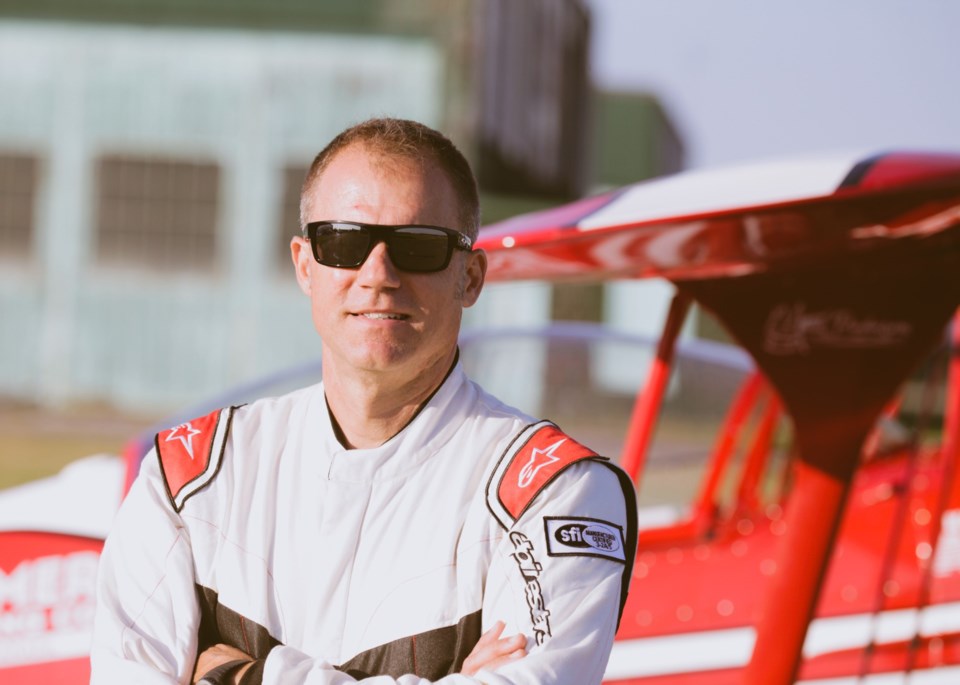Todd Farrell, a seasoned pilot with a remarkable 34-year career, will be one of the highlights at the upcoming 4 Wing Cold Lake Air Show this coming weekend. Farrell, a member of the Northern Stars Aeroteam, a three-plane precision aerobatic formation team composed of Canadian Air Force veterans, brings a wealth of experience and a compelling story of resilience and inspiration.
“My background in aviation started in the Air Cadets, earning my Glider and Private Pilot licences,” Farrell recalls. “The Air Cadet program formed the foundation for my future in aviation. Of course, I learned about flying, but I also learned about things like teamwork, discipline, time management, and the value of hard work, which have been at the root of my success for my entire life.”
Farrell's journey continued through the Royal Military College in Kingston, ON, and pilot training in Moose Jaw, SK, where he flew the CT-156 Harvard II and the CT-155 Hawk. “There were many challenges and memorable moments along the way,” he says, “but for me, the most memorable moment actually did not occur in the cockpit. After pilot training, I achieved my dream posting to Cold Lake to begin Fighter Pilot Training on the CF-188 Hornet.”
However, Farrell's career took an unexpected turn when he was diagnosed with advanced-stage cancer early in his training. “The diagnosis removed me from the cockpit of high-performance aircraft for many years,” he explains. “I was able to beat the disease, but a huge contributing factor to my success was the mental focus, discipline, and power of positive thought that I had honed throughout my training. The support I received from all of 4 Wing and my family pushed me every day to beat the disease. There was a possibility that I would never return to flying a high-performance aircraft again, and today I fly airshows to inspire our followers to achieve the unachievable.”
Despite the challenges, Farrell's military training proved invaluable throughout his career. “The military flying training system gave me excellent instruction and very relevant experience on modern aircraft. It prepared me very well for later in my career as I kept transitioning to more and more complex aircraft. Today, I am an airline captain flying the A320 Airbus, and I still rely on many of the lessons and habit patterns that I was taught during my military pilot training.”
With over 40 different types of aircraft flown in his career, Farrell's favourite remains the CC-177 Globemaster. “I was amazed every time I flew that aircraft,” he says. “I feel as though I had that airplane in every corner of the world, in good situations and bad ones, in combat and peacetime, and it always brought me home.”
Six years ago, Farrell and his close friend Brent Handy formed the Northern Stars Aeroteam. “Today, we are a three-ship aerobatic team flying the Pitts Special, performing between six to ten shows across North America each year. It is an absolute privilege to fly and hopefully inspire an audience at an airshow. The chance to meet and interact with spectators and share the stage with other aviation professionals is an experience like no other.”
Farrell is particularly excited to perform in Cold Lake. “Our team members are all RCAF veterans, and as such, we feel particularly honoured to have the opportunity to perform here in Cold Lake, the home of fighter aviation in Canada, on the occasion of the RCAF 100th anniversary.”
The Northern Stars Aeroteam promises an exhilarating show. “Our show has a lot of smoke, tumbling, precision, and excitement!” Farrell enthuses. “Because of our purpose-built aerobatic aircraft, we are able to fly many aerobatic maneuvers that jet teams cannot, and our smaller turning radius means there will always be something for the crowd to watch at stage center. Listening in to our interplane communications during our show will bring the spectator right into the cockpit with us, and then the spectators can meet us at the crowd line right after the show.”
Preparing for air show performances requires year-round dedication and physical conditioning. Farrell explains that their rigorous training starts at the end of the previous season and includes a detailed pre-show routine to ensure they are mentally and physically ready for each performance.
Farrell concludes with a teaser for the fans, “We fly several maneuvers that are unique for a formation aerobatic team that no other teams in North America are flying, but we can't give away all our secrets here! The fans will have to come see us at the air show to be surprised!”




